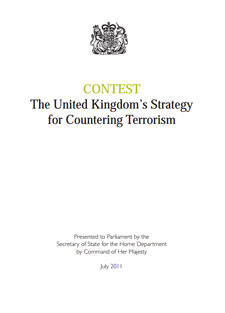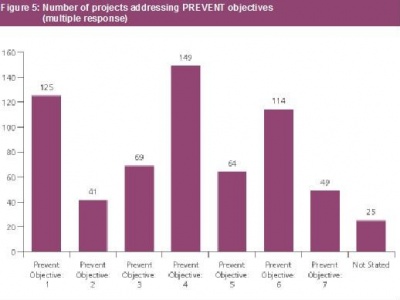Difference between revisions of "CONTEST/Prevent"
(trim) |
(pc) |
||
| Line 22: | Line 22: | ||
==Criticisms== | ==Criticisms== | ||
| − | In 2015, hundreds of academics sent an open letter to The Independent that claimed that Prevent "leads Muslims who grow beards to be labelled as terrorists and could be used to clamp down on anti-austerity and environmental campaigners" and that it "serves to reinforce a prejudicial world view which perceives Islam to be a retrograde and oppressive religion that threatens the West. Prevent reinforces an ‘us’ and ‘them’ view of the world, divides communities, and sows mistrust of Muslims." | + | The Prevent strategy has been called “widely unpopular” and “deeply controversial”.<ref>http://projectcensored.org/14-fbis-new-plan-spy-high-school-students-across-country/</ref> In 2015, hundreds of academics sent an open letter to ''[[The Independent]]'' that claimed that Prevent "leads [[Muslims]] who grow beards to be labelled as [[terrorists]] and could be used to clamp down on anti-austerity and environmental campaigners" and that it "serves to reinforce a prejudicial world view which perceives Islam to be a retrograde and oppressive [[religion]] that threatens the West. Prevent reinforces an ‘us’ and ‘them’ view of the world, divides communities, and sows mistrust of Muslims."<ref>http://www.independent.co.uk/news/uk/politics/government-deradicalisation-plan-will-brand-muslims-with-beards-as-terrorists-say-academics-10381796.html</ref> In the same year a paper in the ''[[Journalism of Terrorism Research]]'', published by St. Andrews University’s [[Centre for the Study of Terrorism and Political Violence]] noted that “It remains exceedingly difficult to gauge the real success of Prevent.”<ref>https://medium.com/insurge-intelligence/the-astonishingly-crap-science-of-counter-extremism-65810f8ac8e6</ref> |
In October 2009, ''[[The Guardian]]'' reported that PREVENT was being used "to gather intelligence" on Muslims individuals "political and religious views, information on mental health, sexual activity and associates, and other sensitive information" even though they had never had any "involvement in terrorism".<ref name="Dodd"/> The Director of [[Liberty]], [[Shami Chakrabarti]], "branded [PREVENT] as the biggest spying programme in Britain ... and an affront to [[civil liberties]]". <ref name="Dodd"/> The Director of the [[Office for Security and Counter-Terrorism]] - [[Charles Farr]] replied that "For the avoidance of doubt, [[mass surveillance|surveillance]] is not part of the Prevent programme and intelligence gathering is not a feature of the Prevent programme. It does not say so in the strategy and does not say so in our guidance documents. What we have said is what you get."<ref>Question 371 by Andy Slaughter to Mr Charles Farr, Preventing Violent Extremism, Sixth Report of Session 2009-10, ''Communities and Local Government Committee'', Ev.76, 19 January 2010, accessed 24.04.10</ref> | In October 2009, ''[[The Guardian]]'' reported that PREVENT was being used "to gather intelligence" on Muslims individuals "political and religious views, information on mental health, sexual activity and associates, and other sensitive information" even though they had never had any "involvement in terrorism".<ref name="Dodd"/> The Director of [[Liberty]], [[Shami Chakrabarti]], "branded [PREVENT] as the biggest spying programme in Britain ... and an affront to [[civil liberties]]". <ref name="Dodd"/> The Director of the [[Office for Security and Counter-Terrorism]] - [[Charles Farr]] replied that "For the avoidance of doubt, [[mass surveillance|surveillance]] is not part of the Prevent programme and intelligence gathering is not a feature of the Prevent programme. It does not say so in the strategy and does not say so in our guidance documents. What we have said is what you get."<ref>Question 371 by Andy Slaughter to Mr Charles Farr, Preventing Violent Extremism, Sixth Report of Session 2009-10, ''Communities and Local Government Committee'', Ev.76, 19 January 2010, accessed 24.04.10</ref> | ||
Revision as of 14:40, 18 April 2017
 | |
| Type | police operation |
|---|---|
| Subpage | •CONTEST/Prevent/Funding •CONTEST/Prevent/Official narrative •CONTEST/Prevent/Pathfinder Fund |
| Description | Part 2 of the UK's counter-terrorism strategy\ |
The PREVENT programme is the second strand of the UK's "counter-terrorism" strategy known as CONTEST that was rolled out under the "war on terror". PREVENT was formerly known as Preventing Violent Extremism. It is managed and funded by the Department for Communities and Local Government, the Foreign Office, the Police, the Home Office and its affiliates, such as the Office for Security and Counter-Terrorism and the Research, Information and Communications Unit. The program may be part of a government-sponsored strategy of tension. It has been widely criticised as unfair to Muslims.[1][2]
Contents
Official narrative
- Full article: CONTEST/Prevent/Official narrative
- Full article: CONTEST/Prevent/Official narrative
The stated objective of PREVENT is to engage and work with Muslim communities to:[3]
- Undermine extremist voices and ideologies so that mainstream voices can speak for the majority of Muslims, who are peaceful and law-abiding citizens
- Disrupt those who promote violence as a methodology for change by strengthening moderate voices and their ability to counter the simplistic arguments and solutions to perceived and real grievances.
- Work with law-enforcement agencies, communities and community leaders to help bring back individuals who may be showing signs of radicalisation and/or extremism through programmes such as the Channel Programme
- Strengthen the Muslim community as a whole to counter the ideas and beliefs of extremists
- Address the grievances that extremists may use to justify their arguments and actions, such as the Iraq war.
Prevent has two supporting objectives: 6. to develop supporting intelligence, analysis and information, and 7. improve Strategic Communications[4]
Criticisms
The Prevent strategy has been called “widely unpopular” and “deeply controversial”.[5] In 2015, hundreds of academics sent an open letter to The Independent that claimed that Prevent "leads Muslims who grow beards to be labelled as terrorists and could be used to clamp down on anti-austerity and environmental campaigners" and that it "serves to reinforce a prejudicial world view which perceives Islam to be a retrograde and oppressive religion that threatens the West. Prevent reinforces an ‘us’ and ‘them’ view of the world, divides communities, and sows mistrust of Muslims."[6] In the same year a paper in the Journalism of Terrorism Research, published by St. Andrews University’s Centre for the Study of Terrorism and Political Violence noted that “It remains exceedingly difficult to gauge the real success of Prevent.”[7]
In October 2009, The Guardian reported that PREVENT was being used "to gather intelligence" on Muslims individuals "political and religious views, information on mental health, sexual activity and associates, and other sensitive information" even though they had never had any "involvement in terrorism".[2] The Director of Liberty, Shami Chakrabarti, "branded [PREVENT] as the biggest spying programme in Britain ... and an affront to civil liberties". [2] The Director of the Office for Security and Counter-Terrorism - Charles Farr replied that "For the avoidance of doubt, surveillance is not part of the Prevent programme and intelligence gathering is not a feature of the Prevent programme. It does not say so in the strategy and does not say so in our guidance documents. What we have said is what you get."[8]
According to the Institute of Race Relations, the problem with "the PREVENT programme, in effect, is that it constructs the Muslim population as a suspect community, fosters social divisions among Muslims themselves and between Muslims and others, encourages tokenism, facilitates violations of privacy and professional norms of confidentiality, discourages local democracy and is counter-productive in reducing the risk of political violence.[9]
Support
The Quilliam Foundation has publicly supported the programme, arguing in favour of mass surveillance that it was "morally right to give law enforcement agencies the best chance of stopping terrorists before they strike".[2]
In practice
In 2015, Staffordshire University apologised to (Muslim) counter-terrorism student Mohammed Umar Farooq. He had been accused of being a terrorist after a University official had spotted him reading a textbook entitled "Terrorism Studies" in the college library.[10]
Funding
- Full article: CONTEST/Prevent/Funding
- Full article: CONTEST/Prevent/Funding
PREVENT was awarded £140 million since its inception in 2006 till 2010-2011.[9] The following are the funding streams of Preventing Violent Extremism:
- Preventing Violent Extremism Pathfinder Fund
- Community Leadership Fund
- Challenge and Innovation Fund
- Preventing Extremism Together
Uncertain Objectives
According to the 2008 Preventing Violent Extremism Pathfinder Fund report published by the DCLG, the DCLG mapped a total of 261 PREVENT projects in 2007/08 for nine English regions and stated that that:
"Over two-fifths of all projects across England sought to challenge the violent extremist ideology/support mainstream voices (Objective 1) and develop understanding, analysis and evaluation (Objective 6)." [11]
In the South West of England, all the projects that were carried out under the Preventing Violent Extremism Pathfinder Fund were categorised by the DCLG Report as assisting in the the delivery of "Objective 6" - collection of intelligence and information.[11]
See Also
Related Documents
| Title | Type | Publication date | Author(s) | Description |
|---|---|---|---|---|
| Document:The Astonishingly Crap Science of 'Counter-Extremism' | webpage | 17 March 2016 | Nafeez Mosaddeq Ahmed | An expose of the crass lack of any valid scientific basis of government strategies to fight radicalisation. Nafeez Ahmed agrues that the "most academically accurate concept to capture this absurd level of crappiness is ‘bullshit’". |
| Document:Unthinking extremism - Radicalising narratives that legitimise surveillance | paper | 26 October 2015 | Ben Harbisher |
References
- ↑ Alan Travis, Ministers dismantle £60m programme to Prevent Violent Extremism, the Guardian, 16 July 2010, accessed 11.08.10
- ↑ a b c d Vikram Dodd, Government Anti-Terrorism Strategy Spies on Innocent, The Guardian 16 October 2009, accessed 25.09.09
- ↑ Preventing Violent Extremism: A Strategy for Delivery HM Government, Date unknown, accessed 25.11.09
- ↑ Pursue, Prevent, Protect, Prepare: The United Kingdom's Strategy for Countering International Terrorism March 2009, HM Government, p.85, accessed 15.03.2010.
- ↑ http://projectcensored.org/14-fbis-new-plan-spy-high-school-students-across-country/
- ↑ http://www.independent.co.uk/news/uk/politics/government-deradicalisation-plan-will-brand-muslims-with-beards-as-terrorists-say-academics-10381796.html
- ↑ https://medium.com/insurge-intelligence/the-astonishingly-crap-science-of-counter-extremism-65810f8ac8e6
- ↑ Question 371 by Andy Slaughter to Mr Charles Farr, Preventing Violent Extremism, Sixth Report of Session 2009-10, Communities and Local Government Committee, Ev.76, 19 January 2010, accessed 24.04.10
- ↑ a b Arun Kundnani, Spooked: How Not to Prevent Violent Extremism Institute of Race Relations, October 2009, p.11, accessed 25.09.09
- ↑ http://www.theguardian.com/education/2015/sep/24/student-accused-being-terrorist-reading-book-terrorism
- ↑ a b c Department of Communities and Local Government, Preventing Violent Extremism Pathfinder Fund: Mapping of project activities 2007/2008, December 2008, p.47 accessed 17.03.10
